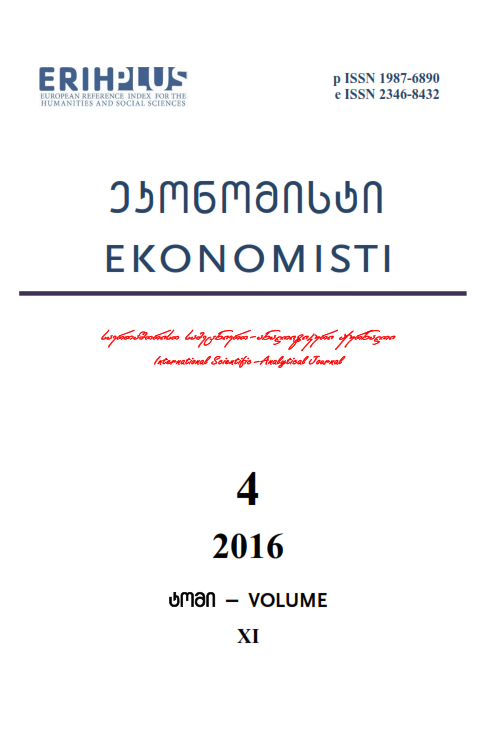
The international scientific and analytical, reviewed, printing and electronic journal of Paata Gugushvili Institute of Economics of Ivane Javakhishvili Tbilisi State University

Foreign Direct Investments Attraction and Management in Georgia
Expanded Summary
The article focuses on the role of FDI in Georgia’s economic development. To attract as much FDI as possible, a proper investment climate should be in place - institutional, political and regulatory environment. Well developed investment climate is the chance and motivation for both, local economy and foreign companies, to generate maximum income, create new work places and improve the quality of life in the given country. FDI trend is one of the best indicators of country’s economic sustainability and its attractiveness. Especially for small and developing countries, the amount of FDI matters, therefore most of such countries are trying to compete with each other through improving their investment climate according to different world famous indexes, such as: Global Competitiveness Index, Doing Business, Corruption Perception Index, Economic Freedom Index and etc. As a result of impressive reforms since 2003, Georgian economy has benefited with large invasion of FDI, however the level of per capita GDP is still law in comparison to Eastern European countries and it should be improved. The main idea of the paper is to show a real linkage between FDI and employment ration, on the case of Georgian economy
Based on Investment Development Path, research shows that Georgia is on the second level of its development (see diagram 1), which means that inflow investments are prevailing on outflow investments and the country is still progressing based on non-modern technologies based economy. It can largely explain the role of the Government of Georgia in the evolution of the competitiveness of Georgian enterprises and of Georgia as a production location. It also predicts the direction of Georgian outward FDI to neighbor countries and highlights the relevance of the two-way relationship between inward FDI and the upgrading of the country’s location advantages, on the one hand, and with the development of domestic firms’ ownership advantages on the other hand.
Diagram1
Investment Development Path, Case of Georgia

Source: Author’s calculations, based on WB data.
Research based on 80 different investor countries in Georgia show that the biggest part of FDI’s are: 1. Efficiency seeking investments –16%; 2. Efficiency seeking investments – 16% and 3. Resources seeking investments - 3% (Diagram 2). Based on the research we can say that Georgia is still a country of low paid workforce and foreign investors are more interested in the local market occupation then in conquering international markets using Georgian opportunities and economic attractiveness.
diagram2
Left – Trend for FDI Motivations; Right - IDP for FDIinflow in Georgia
2007-2013 years.


Source: Author’s calculations, based on GEOSTAT data.
The fact that FDI’s are positively affecting the development of Georgian economy is proved by the contribution Index, which shows that the companies created with help of FDI’s are: employing around 1/5th of all Georgian employees; taxes generated from such companies makes up to half of all collected taxes; makes up to ½ of all exported products form Georgian and etc (see table 1).
Table 1
Contribution Index (2011 year, in percents)
|
Region / Economy |
Value added |
Employment |
Exports |
Tax Income |
Salary |
R&D |
Capital Formation |
|
Developed Countries |
12,7 |
7,5 |
19,3 |
13,9 |
14,6 |
24,2 |
10,5 |
|
Developing Countries |
12,2 |
7,9 |
17,3 |
14,6 |
15,4 |
24,1 |
11,6 |
|
Transitional Countries |
21,7 |
3,0 |
... |
... |
11,2 |
15,4 |
25,7 |
|
Georgia |
33 |
18 |
47 |
46.5 |
15 |
... |
40 |
Source: UNCTAD
Attracting FDI to Georgia is an issue of major importance nowadays. Georgia is not short of local dynamos of economic enlargement that could potentially catch the attention of investors; however, the small efforts done for the promotion of local savings to transform it to the investments is hinder the economic development of the country. Foreign Direct Investment works as a locomotive to enlarge the transfer of technology, skills and access to export markets. It can decrease unemployment and increase employment; contribute to a higher GDP through higher levels of productivity.
While empirical analyses show the institutional factors as a key challenge for FDI inflows, less attention is given to the relationship between political risk and investment decision. Many of transition economies of Eastern Europe and the CIS have practiced an enormous progress in FDI inflows during the past decade. Meanwhile, other countries in the region especially with low democratic characterizes – have been usually ignored by international investors. Fortunately Georgia has overcome this negative factor.
The government of Georgia is ready and willing to provide greatest assistance to investors in the Georgian economy. Particular attention is paid to improving the business climate through further streamlining the business regulation procedures, liberalizing the financial sector and even more decreasing the tax burden.
